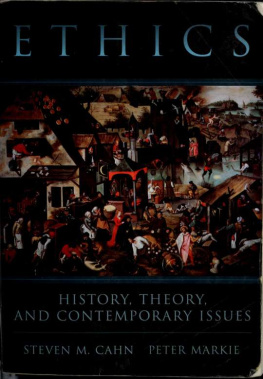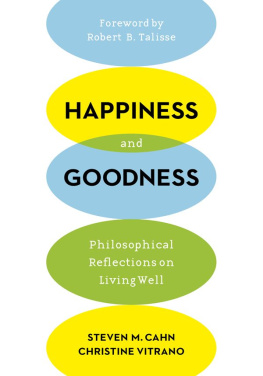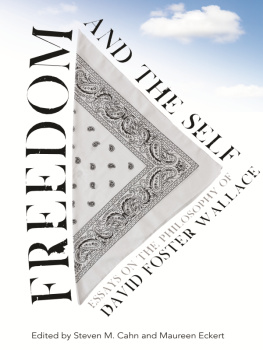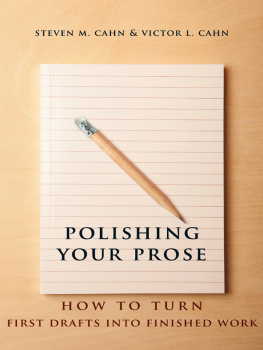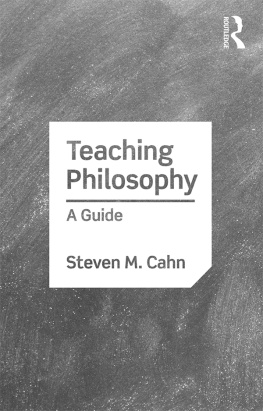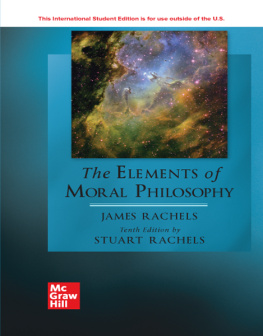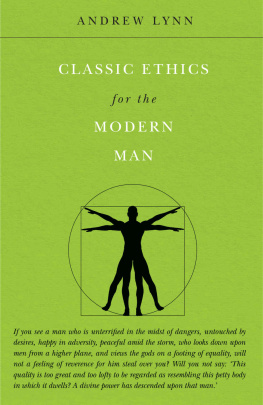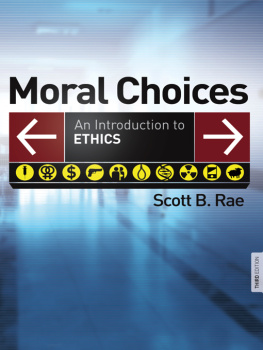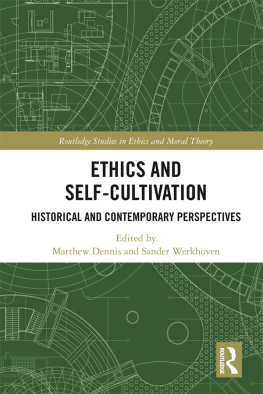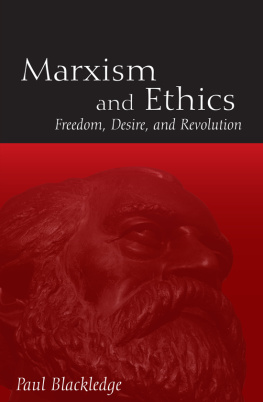This book made available by the Internet Archive.
CONTENTS
10. Immanuel Kant / 275
Fundamental Principles of the Metaphysk of Morals I 275
11. Jeremy Bentham / 318
An Introduction to the Principles of Morals and Legislation (selections) I 319
12. John Stuart Mill / 343
Utilitarianism I 343
13- Soren Kierkegaard / 381
Fear and Trembling (Problema I & 11) I 382
14. Arthur Schopenhauer / 397
On the Sufferings of the World I 397
15. Friedrich Nietzsche / 404 Beyond Good and Evil (selections) / 405
On the Genealogy of Morals (selections) I 413 The Twilight of the Idols (selections) I 420
16. William James / 423
The Moral Philosopher and the Moral Life I 423
17. John Dewey / 436
The Quest for Certainty (selections) I 436
18. Albert Camus / 452 The Myth of Sisyphus I 452
19. Jean-Paul Sartre / 459 Existentialism Is a Humanism I 460
II MODERN ETHICAL THEORY / 469
Introduction, by James Rachels / 469
20. G. E. Moore / 479
Principia Ethica (selections) / 479
21. W. D. Ross / 486
The Right and The Good (selections) I 486
22. C. L. Stevenson / 496
The Emotive Meaning of Ethical Terms I 496
23. R. M. Hare / 508
Freedom and Reason (selections) I 508
,
CONTENTS
24. Kurt Baier / 519
The Point of View of Morality I 519
25. Gilbert Harman / 536
The Nature of Morality {selections) I 536
26. James Rachels / 548
The Challenge of Cultural Relativism I 548
27. Joel Feinberg / 557-Psychological Egoism I 557
28. Bernard Williams / 566
A Critique of Utilitarianism I 566
29. Richard B. Brandt / 584
Some Merits of One Form of Rule Utilitarianism I 584
30. Joel Feinberg / 603
The Nature and Value of Rights I 603
31. PhilippaFoot / 614
Morality as a System of Hypothetical Imperatives I 614
32. John Rawls / 621
A Theory of Justice (selections) I 621
33. David Gauthier / 641 Why Contractarianism? / 641
34. Alasdair Maclntyre / 653 After Virtue (selections) I 653
35. James Rachels / 669
The Ethics of Virtue I 669
36. Virginia Held / 682
Feminist Transformations of Moral Theory I 682
37. J. O. Urmson / 699 Saints and Heroes I 699
38. Susan Wolf / 708 Moral Saints I 708
39. Thomas Nagel / 722 Moral Luck I 722
III CONTEMPORARY MORAL PROBLEMS / 733
Introduction, by Peter Singer / 733
40. Judith Jarvis Thomson / 737
A Defense of Abortion I 737
41. Michael Tooley / 749
Abortion and Infanticide / 749
42. James Sterba / 766
Abortion, Distant Peoples, and Future Generations I 766
43. James Rachels / 778
Active and Passive Euthanasia / 778
44. PhilippaFoot / 782 Euthanasia I 783
45. Peter Singer / 799
Famine, Affluence, and Morality I 799
46. John Arthur / 807
Famine Relief and the Ideal Moral Code I 807
47. Tom Regan / 821
The Case for Animal Rights I 821
48. Carl Cohen / 829
The Case for the Use of Animals in Biomedical Research I 829
49- Ernest van den Haag / 837
In Defense of the Death Penalty I 837
50. Stephen Nathanson / 849
An Eye for an Eye: The Morality of Punishing by Death {selections) I 849
51. Thomas E. Hill Jr. / 860
The Message of Affirmative Action I 860
52. John Kekes / 878
The Injustice of Affirmative Action Involving Preferential Treatment I 879
i
Preface
This comprehensive collection offers instructors the opportunity to construct courses in ethics combining as wished the history of moral philosophy, modern ethical theory, and contemporary moral problems. The readings are reprinted, wherever possible, without omissions. Among the major historical works presented unabridged are Plato's Euthyphro, Apology, and Crito, Kant's Fundamental Principles of the Metaphy sic of Morals, and Mill's Utilitarianism.
The idea for such an inclusive volume developed from conversations with Robert Miller, our editor at Oxford University Press, and we are most grateful for his initial encouragement and continuing support. We thank those anonymous referees, chosen by the Press, who offered helpful suggestions regarding the book's structure and contents. We also wish to express our appreciation to Ian Gardiner for his conscientious proofreading and to the staff of Oxford University Press for providing generous assistance throughout the stages of production.
* Introduction
All of us from time to time reflect on the moral dimension of our lives: what sorts of persons we ought to be, which goals are worth pursuing, and how we should relate to others. We may wonder about the answers to these questions that have been provided by the most profound thinkers of past generations; we may speculate whether their conflicting opinions amount to disagreements about the truth or are merely expressions of their differing attitudes; we may consider how their varied theories might help us understand moral issues of our own day.
This book of readings provides the materials to address these matters. In Part I we have collected the most influential ethical theories from nearly 2,500 years of philosophical thought, beginning in ancient Greece with Socrates, Plato, and Aristotle and continuing through medieval and modern times to the twentieth-century French thinkers Camus and Sartre. Part II contains recent articles that explore theoretical issues concerning the nature of moral judgments, the resolution of moral disagreements, and the evaluation of moral theories. Part III offers reflections on contemporary moral problems, including abortion, euthanasia, famine relief, animal rights, capital punishment, and affirmative action. In each case thoughtful arguments for and against are presented for your consideration.
Which philosophical positions are correct? Just as each member of a jury at a trial needs to make a decision and defend a view after considering all the relevant evidence, so each philosophical inquirer needs to make a decision and defend a view after considering all the relevant opinions. This book makes available in convenient form the materials on which to base your thinking. But the challenge and excitement of philosophy is that, after taking account of the work others have done, the responsibility for reaching conclusions is your own.
Should you wish to learn more about particular moral philosophers or specific moral issues, an excellent source to consult is the Encyclopedia of Ethics (Garland, 1992), edited by Lawrence C. Becker, which contains detailed entries with bibliographies on every significant topic in the field.
PARTI
Historical Sources
INTRODUCTION
by Alasdair Maclntyre
Alasdair Maclntyre is Professor of Philosophy at Duke University. He examines the importance of an understanding of the history of ethics to contemporary work in the field.
Moral Philosophy is often written as though the history of the subject were only of secondary and incidental importance. This attitude seems to be the outcome of a belief that moral concepts can be examined and understood apart from their history. Some philosophers have even written as if moral concepts were a timeless, limited, unchanging, determinate species of concept, necessarily having the same features throughout their history, so that there is a part of language waiting to be philosophically investigated which deserves the title "the language of morals" (with a definite article and a singular noun). In a less sophisticated way, historians of morals are all too apt to allow that moral practices and the content of moral judgments may vary from society to society and from person to person, but at the same time these historians have subtly assimilated different moral conceptsand so they end up by suggesting that although what is held to be right or good is not always the same, roughly the same concepts of right and good are universal.

